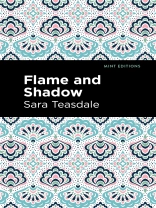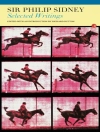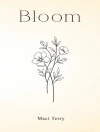Flame and Shadow (1920) is a poetry collection by Sara Teasdale. The poet’s fifth collection, published two years after she won the 1918 Pulitzer Prize, is a masterful collection of lyric poems meditating on life, death, and the natural world. Somber and celebratory, symbolic and grounded in experience, Flame and Shadow revels in the mystery of existence itself. “What do I care, in the dreams and the languor of spring, / That my songs do not show me at all?” Content to depict the rhythms of nature, the songs of birds, and “the silver light after a storm, ” Teasdale’s poetry dissolves the poet’s ego in order to access a deeper well of creative energy: “For my mind is proud and strong enough to be silent, / It is my heart that makes my songs, not I.” In “There Will Come Soft Rains, ” a poem born from a decade of war and widespread disease, Teasdale imagines a posthuman world where beauty and harmony continue despite our disappearance: “Robins will wear their feathery fire / Whistling their whims on a low fence-wire; And not one will know of the war…” For Teasdale, a poet who merges an abiding affection for flora and fauna with a critical distance from human affairs, the belief in the life of the world, with or without us, is enough. This edition of Sara Teasdale’s Flame and Shadow is a classic work of American poetry reimagined for modern readers.
Since our inception in 2020, Mint Editions has kept sustainability and innovation at the forefront of our mission. Each and every Mint Edition title gets a fresh, professionally typeset manuscript and a dazzling new cover, all while maintaining the integrity of the original book.
With thousands of titles in our collection, we aim to spotlight diverse public domain works to help them find modern audiences. Mint Editions celebrates a breadth of literary works, curated from both canonical and overlooked classics from writers around the globe.
Over de auteur
Sara Teasdale (1884-1933) was an American poet. Born in St. Louis, Missouri, Teasdale suffered from poor health as a child before entering school at the age of ten. In 1904, after graduating from Hosmer Hall, Teasdale joined the group of female artists known as The Potters, who published The Potter’s Wheel, a monthly literary and visual arts magazine, from 1904 to 1907. With her first two collections—Sonnets to Duse and Other Poems (1907) and Helen of Troy and Other Poems (1911)—Teasdale earned a reputation as a gifted lyric poet from critics and readers alike. In 1916, following the publication of her bestselling Rivers to the Sea (1915), she moved to New York City with her husband Ernst Filsinger. There, she won the 1918 Pulitzer Prize for Love Songs (1917), her fourth collection. Frustrated with Filsinger’s prolonged absences while traveling for work, she divorced him in 1929 and moved to another apartment in the Upper West Side. Renewing her friendship with poet Vachel Lindsay, she continued to write and publish poems until her death by suicide in 1933.












